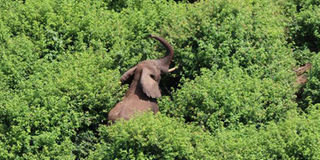We can and must save piece of vanishing Africa for posterity

An elephant in Imenti Forest, Meru. PHOTO | KENNEDY KIMANTHI | NATION MEDIA GROUP
What you need to know:
There should be no more settlement in forests, not one inch.
Those who are squatting on forests must leave.
Killing wildlife should be a capital offence.
We should plant indigenous trees like mad – none of that exotic crap, but our own wholesome African trees.
A puppy kissed me at the Westgate Mall parking lot in Nairobi this past week. He was a handsome little boy, all glorious white with a patch of the darkest black, a silky coat and sweet puppy breath.
I had to remind myself that it would be unseemly, at 48, to sit in a public place and play with a dog. And I had to be physically retrained from buying him on the spot. I probably still will.
At Tree Biotech, Karura Forest, where they breed, among others, traditional trees, I was transported to my childhood and the great mountain forests where I grew up.
The familiar feel of indigenous bark, the long forgotten smell of a favourite sap, the cool, oxygen-rich air of the woods, the mighty trees, this is home.
The terrible tragedy is, while we are dancing for Uhuru Kenyatta and Raila Odinga, we are losing our heritage, our identity as an African race. Our rivers, streams, springs and wells have nearly all dried up. Our forests are gone. A few weeks ago, Macharia Gaitho shared a picture of the peaks of Mount Kenya completely clean of snow.
Our children are growing up never having touched an animal and never having climbed a tree. What kind of Africans are we breeding? I count myself lucky, having known one of the last true Africans, my grandfather, who never tired of reminding me that when the first missionaries set foot in our land, he was already a big boy.
“Boy” in the context of my grandfather was a somewhat complicated affair. He ran away from home to avoid circumcision and lived among a neighbouring tribe until my great-grandfather, fed up with the shame, sent a war party to bring him home to face a surgeon by force. He was 40 (according to unkind family sources).
DUAL HERITAGE
He was like an ancient African insect frozen in amber and from him I learnt about our dual heritage as pastoralists and cultivators. The women stayed in the forests and grew yams and grains, the men roamed the plains with their animals.
When I was born, I found my grandfather with the remnants of his herd. The plains were gone, but he still maintained a semi-nomadic lifestyle. He drove his animals into the forest every day and brought them home at sunset.
And when the wandering bug bit him, he would cut across the forest and into Kibirichia, Ntirimiti, Kisima, Ngusishi, Timau and into Laikipia, visiting relatives and the places of his youth, when Africa was ours. He would wander tens of kilometres on foot, armed with a big stick and a sword in a rawhide scabbard hidden in his many coats.
I have known many pleasures, the Lord help me, but none surpasses going herding with my grandfather. This didn’t happen often. I wasn’t allowed to do stuff with my grandfather, because he was not a Christian and did not prescribe to modern theories of hygiene. But a willing heart often found a way.
It wasn’t just the intoxicating mountain air, the delicious danger of running into an elephant or buffalo hiding in the dark, forbidding woods, or being shot with a poison arrow by the remnants of the Ogiek, who were believed to inhabit the forest, it wasn’t even gorging on wild fruit and berries, or even my grandfather’s stories, if he was in the mood. It was just a matter of a species in its natural habitat. We are children of the woods.
UNLIKE OTHERS
A thing about my grandfather’s herd: they were unlike any of the other animals I had seen. With fancy names like Nontoyie, they were more of human beings than animals. Obedient, placid and affectionate, they followed the herdsman and responded to gentle commands.
One of my earliest memories was sheltering from the rain, which was coming down in a solid, grey sheet, under a massive, centuries-old tree, under which it was perfectly dry, the animals gently pressing against us, keeping us warm. We stood there for hours, watching the rain. There was no IMF, no school, no church, just the elements and us, Africans.
I am not a very clever man, but I know I have lost something very important. Perhaps, I have even lost a part of myself. I also know that unless we stop being so stupid, we will lose our lives.
This will be a vast, dry wasteland before long. We have lost our forests, our rivers and most of our animals. We have gotten diseases – diabetes, high blood pressure, cancer and ulcers. Can we reclaim a part of our homeland and save our children from extinction? Can we save a little piece of Africa – the way we save a birthday cake – for future generations?
There should be no more settlement in forests, not one inch. Those who are squatting on forests must leave. Killing wildlife should be a capital offence. And we should plant indigenous trees like mad – none of that exotic crap, but our own wholesome African trees. There is plenty of space to plant trees in your quarter in Kitengela.
Finally, can somebody organise us so that we put money and energy in the propagation and preservation of traditional flora?





